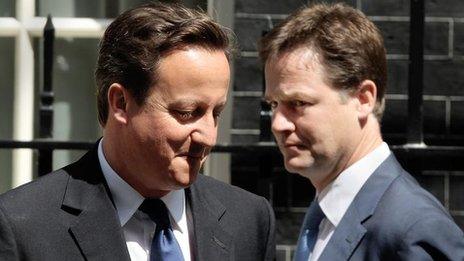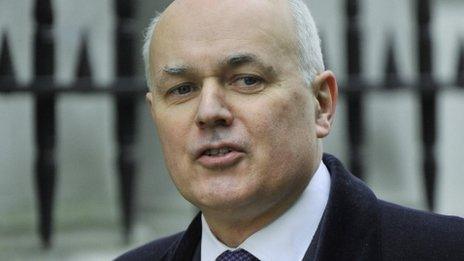Key Cameron ally urges scrapping of universal pensioner benefits
- Published
- comments
Key Cameron ally, Nick Boles, urges scrapping of universal pensioner benefits ahead of next election
A close ally of the prime minister is calling for the winding up of universal benefits to better off pensioners at the next election as he urges a shift to only policies which he believes will raise the productivity and competitiveness of the UK's workforce.
Conservative MP Nick Boles is also urging a significant further scaling back of tax credits and housing benefit, and a re-examination of the "lazy sentimentalism" of the Sure Start programme of children's centres.
Mr Boles will appear on Newsnight on Monday to propose ways his party can best address the decline in living standards, faltering in the UK for the last decade.
Previewing ideas he will set out in full with a speech on Tuesday to the independent Resolution Foundation - whose work is devoted to diagnosing the problems affecting low to middle income earners - Mr Boles proposes a philosophical shift that should guide the next round of spending cuts due for 2013 or 2014.
He will say that only those tax and spending policies that can explicitly be seen to increase competitiveness of the UK workforce should be supported.
The ultra-modernising MP has worked alongside the current Conservative leadership since opposition.
He founded the think tank Policy Exchange - a petri dish of ideas for the Conservative leadership - and though the ideas in his speech to the Resolution Foundation are his own, he is close to many leading members of the government and suggests the next wave of Conservative ideas being contemplated as all parties consider further public spending cuts.
His proposal to re-evaluate the effectiveness of Sure Start will be uncomfortable for his Liberal Democrat coalition partners. Mr Boles is the parliamentary private secretary to Schools Minister Nick Gibb, in the education department which has oversight over Sure Start.
Mr Boles has devoted much energy to considering the issues affecting those on low to middle incomes as they struggle to keep their earning power up in the face of downward trends in earnings and living standards afflicting all developed economies.
In his speech Mr Boles will say: "It is my contention that politicians - of all parties - have barely begun to wrestle with the implications of the stagnation in living standards or confront the agonising choices that we will be forced to make in the decades to come."
He believes:
The housing benefit budget, which has risen to £22bn a year, should be cut further: "I challenge anyone to show that this is the most cost-effective way to help people into work or to tackle our generational failure to provide enough affordable homes for our growing population."
Non-pension benefits - Winter Fuel Allowance, free bus travel, free prescriptions and free TV licences for the over 75s - for better-off pensioners should go in 2015: "Does anyone here think it would be responsible for a country in our financial position to go on giving free TV licences to Sir Michael Winner, free eye tests to Lord Sugar and a winter fuel allowance to Sir Paul McCartney after 2015?"
On child tax credits: "They do little to help parents get into work and nothing to incentivise them to take steps to improve their capacity to command a decent wage in future." "Does anyone really believe that the best way of helping the next generation escape poverty and build better futures for themselves is to spend £30bn on financial transfers to their parents and only £5bn on education for the under 5s."
On Sure Start costing £1.1bn a year: "Many might think that Sure Start would be a good candidate for more money. But I am afraid that would be to perpetuate the kind of lazy sentimentalism that has seen so much taxpayer's money wasted over the last decade."
"If we are going to make any difference to the future productivity of working people and the competitiveness of our economy, we must abandon this soggy approach and demand that the programmes we invest in have a substantial and measurable impact. Otherwise, we should leave the money in the hands of taxpayers, from whence it came," Mr Boles will say.
"Productivity and competitiveness are my lodestars because I am convinced that the only way that we can restore sustained improvement in living standards is if most working people in Britain can command high and steadily increasing wages in the market place.
"It may be true that, for some, total household income has continued to grow because a previously unemployed partner has started work or one or both partners have increased the number of hours they work.
"It may also be true that increased financial transfers by government have helped many people on low pay enjoy rising incomes despite the stagnation in their wages. But it seems obvious to me that neither of these trends is sustainable - and, even if they were, we should not want them to be sustained.
"What will it do for our health and happiness (let alone that of our children) if the only way to achieve a growing income is to work longer hours? And which of us really believes that any government will be able to expand every year the amount of money it gives to those whose wages have stalled?" he goes on.
He will also challenge the Labour leadership to reveal which taxes they would raise to reconcile their public spending pledges with their declared commitment to deficit reduction.
Mr Boles becomes the most senior of modernisers around the prime minister to endorse the scrapping of benefits for the elderly, as well as proposing a delay in bringing in social care.
Work and Pensions Secretary Iain Duncan Smith has said before that universal benefits for the elderly might have to go, but in a recent speech on welfare the prime minister ruled out ending them within this Parliament.
- Published8 May 2012

- Published28 April 2012

- Published8 February 2012